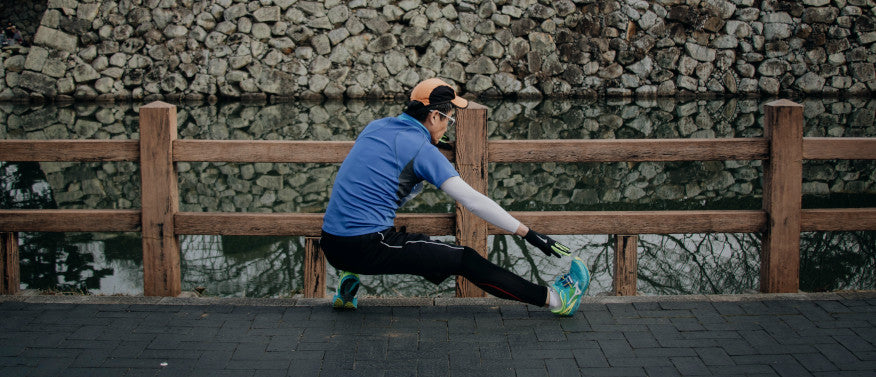You've achieved a new personal best, your motivation is higher than ever, and everything is going according to plan. But then the one thing comes along that holds you back and keeps you confined to bed: a cold. How are colds and exercise related? What exactly is the open window effect, and what can you do to avoid getting sick?
Table of contents
1. What is the open window effect?
If you're now thinking, "Wait a minute, exercise is exactly the right thing to strengthen yourself against colds?", you're not wrong. Exercising reduces your susceptibility to infection because it strengthens your immune system and makes you better prepared to fight infections. However, depending on how intensively and extensively you dedicate yourself to training , it's also possible that your immune system will be weakened [1].
Immediately after unusual or particularly intense exercise, your body is more susceptible to inflammation in the upper respiratory tract, such as a cold. This phenomenon is described as the "open window effect." It occurs due to a reduced number of white blood cells , which are simultaneously impaired in their function [2]. Viruses and bacteria also have an easier way past your immune system when the figurative window for infection is open after exercise [3].
Take-Home Message #1:
Your immune system benefits from physical activity in most cases. But especially during intense training phases or immediately after individual workouts in which you've exerted yourself, the window for infection is wide open. A cold is often a result of exercise.
To not only help you recover quickly after exercise but also strengthen your immune system, we developed RECHARGE together with experts from the Cologne Sport University. With a blend of amino acids, electrolytes, and trace elements, it's precisely tailored to the needs of athletes after a workout.
2. What should you pay attention to in order not to get sick?
In general, your immune system benefits from a consistent, moderate level of activity [2].
By avoiding overtraining, you can protect yourself quite reliably against infections. You can also use the following checklist to prevent infections:
- Keep your vaccination certificate up-to-date
- Minimize contact with people who are carrying an infection
- Wash your hands regularly
- Do not share drinks bottles, towels
- Protect your respiratory tract from particularly warm or cold air during strenuous exercise
- Make sure you get enough carbohydrates
- Dress appropriately for the weather
- Try to get at least seven hours of sleep per night [4]
Take-Home Message #2:
So, don't overdo it when it comes to exercise. Instead of occasionally completely exhausting yourself during training, you should aim for a moderate level of activity that is consistently and regularly integrated into your daily routine. This is the best way to protect yourself from infections. You should also get vaccinated regularly, minimize contact with sick people, and wash your hands regularly.
3. Sick after exercise: What can you do?
What if it's already too late? You've caught a cold from exercise, you're suffering from a cold, and you still want to get back on your feet as quickly as possible to achieve your training goals. The following steps can help you in the days following the onset of symptoms.
Day 1:
Today, you should avoid training because of your cold. Drink plenty of fluids and avoid exposure to wet or cold conditions. You should also avoid everyday stress as much as possible.
Day 2:
If your symptoms—such as a runny nose, sore throat, cough, or similar—have worsened, you shouldn't exercise today either. If you notice an improvement, you can do light exercise if it's important for your training plan. You shouldn't be active for longer than 45 minutes!
Day 3:
If you don't have a fever and are feeling a little better, you can do a light to moderate workout for 60 minutes.
Day 4:
Continue to rest today if your symptoms still haven't improved. This applies even if you have a fever! If today is the first day you feel better, you can do some light exercise as described for Day 2.
The rule of thumb is that you should use the same number of days you missed to gradually increase your training workload. When in doubt, it's better to give your body too much rest than too little!
Take-Home Message #3:
The motto is: Better too much rest than too little. Exposing yourself to strenuous activity can be dangerous, especially when you have a fever. Once you feel better, you can slowly increase your training again.
4. Conclusion
As an athlete, you're essentially well protected against infections. However, this requires you to be careful to avoid overtraining. Especially in this case, your immune system is weakened immediately after exercise, creating an open window for all kinds of infections (the "open window effect") .
Therefore, you should always dress appropriately, get regular vaccinations, wash your hands often, consume sufficient carbohydrates, and get enough sleep. Should you ever get sick, you should never overexert yourself and should consult a doctor.
Are you on your way to improved concentration, more energy, increased well-being, or better sleep and could use a little help? Our performance coaches are available to provide you with personalized advice free of charge.
5. Sources
[1] Rosener, E. () Katherinenhospital Stuttgart. Marfan Syndrome. Springer Verlag, Berlin, Heidelberg. Sport and Fitness in Everyday Life – Possibilities and Limitations in Marfan Syndrome. [ https://link.springer.com/chapter/10.1007%2F978-3-662-53259-1_5 ]
[2] Pilat, C. (2015) Science Direct. Prevention and Therapy Through Sport, Volume 1 (2nd edition), pages 221-236. 8 - Sport and the Immune System. [ https://www.sciencedirect.com/science/article/pii/B9783437242557000086 ]
[3] Åkerström, TC A; Pedersen, BK (2007) Sports Medicine, April 2007, Vol. 37, Issue 4-5, pp 416-419. Strategies to Enhance Immune Function for Marathon Runners . [ https://link.springer.com/article/10.2165/00007256-200737040-00037 ]
[4] Hackney, A.C.; Koltun, KJ (2012) Acta Clin Croat, Vol. 51, No. 4, 2012. The Immune System and Overtraining in Athletes: Clinical Implications. [ https://pdfs.semanticscholar.org/9f1e/7564bdba2b55733c3d6f260ad04e96944817.pdf ]














